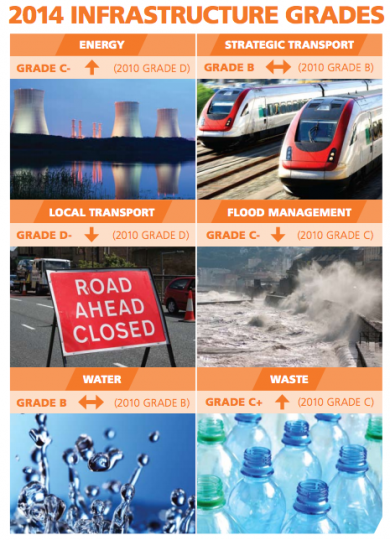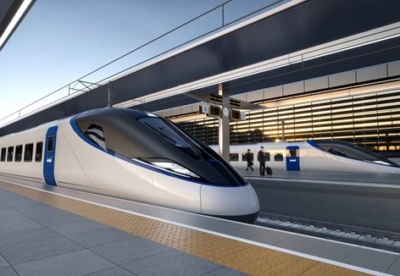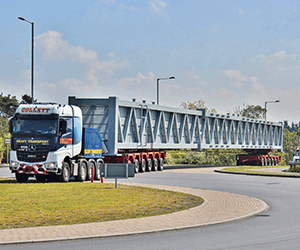The sweeping survey of the country infrastructure show that water, waste and strategic transport infrastructure is being maintained or improving.
But the civil engineers warn that the local roads network is on the brink and flood management and energy infrastructure is at risk from harsh weather.
The ICE has called on the Government to reassess the resilience of infrastructure against more variable weather patterns with a programme to future proof the infrastructure network.
How the country is doing compared with four years ago

A=fit for the future, B=Adequate for now, C=Requires attention, D=At risk, E=Unfit for purpose. +/- conveys direction of change
The ICE report said resilience – including the “domino effect” where the failure of one system can affect the operation of another – should be embedded into the criteria used as a basis for making decisions on priority infrastructure projects, to better reflect future challenges.
It also warns that that public expectation that infrastructure will work effectively at all time needs to be managed by Government.
ICE Vice President, Keith Clarke, said: “As the 2013/14 winter floods showed, unplanned interruptions in our networks are costly to society and the economy.
“They happen because we are trying to run all services at all times, and are deemed unacceptable as the public expect a certain level of service. Government ultimately bears the risk for the resulting impact.
“It is becoming clear that extreme weather events will become more frequent, and it is time that factors such as availability, resilience and the “domino effect” across the networks when one network fails are rooted into the criteria used to make decisions on which projects go ahead so new infrastructure is more “future proofed”.
He added: “Clearly there are some difficult decisions ahead regarding just how resilient the UK should be, and also what networks can and should operate 24/7 in what conditions.
“The onus is on Government to make these choices for public sector infrastructure, and it must also build on its efforts to provide the right regulatory incentives to improve resilience within private sector infrastructure.” he added.
Key ICE recommendations
On strategic decision making and leadership, Government should:
1. Expand the criteria used as a basis for making decisions on priority infrastructure projects to reflect major future challenges– criteria should include resilience, availability, the pathway to a low carbon economy and better acknowledge “interdependencies” across networks – or how one sector impacts on another.
2. Be prepared to make tough choices regarding the levels of resilience in the UK’s infrastructure networks and the appropriate levels of service/availability – and work with industry to manage public expectation.
3. Ensure the right regulatory environment exists to incentivise private infrastructure operators to build resilience into infrastructure.
4. Be appropriately resourced to make and implement decisions on key issues affecting the UK’s resilience or competitiveness, such as aviation capacity.
5. Provide more clarity, certainty and transparency for potential investors through the regularly published National Infrastructure Plan project pipeline – by including more detail on investable projects, their status, planning approval, ownership structure and revenue streams.
On Energy, Local Transport and Flood Management sectors:
6. The Environment Agency and Lead Local Flood Authorities should fully implement a holistic approach to flood management, which includes a wider range of measures in addition to conventional flood defences – including building the physical resilience of communities by making property and infrastructure more resistant.
7. Government should provide the longer term certainty needed to improve flood resilience by committing to a long term capital and maintenance programme for Flood Management which protects funding beyond the current 5 year cycle.
8. Government should enact the secondary legislation to implement EMR by the end of this Parliament, establishing long-term investor confidence and entrenching cross-party support for electricity decarbonisation.
9. Government should extend devolved transport powers and funding through the creation of more powerful, fully integrated transport authorities in city regions.
10. Government and local authorities must establish a more ambitious joint programme to clear the road maintenance backlog, and commit to a more cost effective planned, preventative maintenance regime.


































 MPU 300_250px.gif)




















.gif)
